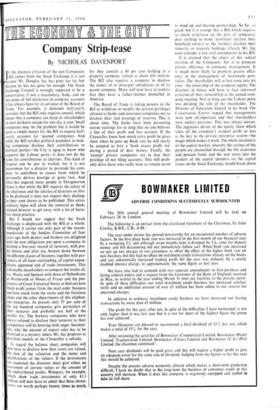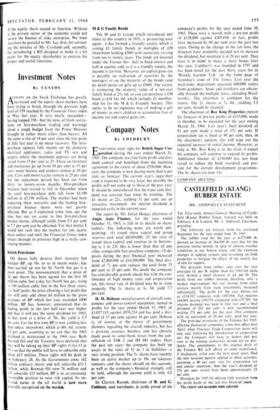HE ECOKONV COVY
Company Strip-tease
By NICHOLAS DAVENPORT
'Billthe sharpest criticism of the new Companies 'Bill comes from the Stock Exchange it is not because Mr. Douglas Jay has gone too far but because he has not gone far enough. The Stock Exchange Council is wrongly supposed to be a conservative, if not a reactionary, body, and on this point of full disclosure in company accounts it has always been far in advance of the Board of Trade. For example, it demands half-yearly accounts, but the Bill only requires annual, which means that a company can keep its shareholders in utter darkness except for one day a year. Small companies may be the problem but it would be quite a simple matter for the Bill to require half- yearly accounts for 'quoted' companies. And while the Bill satisfies political prejudice in mak- ing companies disclose their contributions to political parties—the City is agog to know who supports the Labour party—it does not do the same for contributions to charities. This kind of largesse can be just as wicked, for it is not uncommon for a director to persuade his com- pany to contribute to causes from which he personally derives prestige or gains face. And what has angered many people in Throgmorton Street is that while the Bill requires the salary of the chairman and the salaries of directors en bloc to be disclosed it does not require their dealings in their own shares to be published. This extra- ordinary lapse will allow the immoral or thick- skinned director to get away with a lot of lucra- tive sharp practice.
But I would not suggest that the Stock Exchange is displeased with the Bill as a whole. Although it carries out only part of the recom- mendations of the Jenkins Committee of four years ago both dealers and brokers are delighted with the new obligations put upon a company to disclose a five-year record of turnover, with pro- fits before and after tax, broken down between the different classes of business, together with par- ticulars of all loans outstanding, of capital expen- ditures approved and of trade investments. This will enable shareholders to compare the results of, say, Marks and Spencer with those of Debenhams or Woolworth or House of Fraser and the pro- prietors of Great Universal Stores to find out how much profit comes from the mail order business and how much from the stores and the furniture shops and the other departments of this elephan- tine enterprise. At present only 37 per cent of the top hundred companies give particulars of their turnover and probably not half of the smaller fry. The brewery companies who have always refused to disclose their turnover to their competitors will be brewing with anger. Incident- ally, why the amount of export sales has to be disclosed is a mystery unless Mr. Jay proposes to distribute medals or the Chancellor a subsidy.
As regard the balance sheet, companies will now have to disclose how their assets are valued, the date of the valuation and the name and qualifications of the valuers. If the investments are unquoted the directors must give either an assessment of current values or the amount of the undistributed profits. Wimpeys, for example, which show trade investments at only f1.1 million, will now have to admit that these invest- ments are worth perhaps twenty times as much,
for they contain a 40 per cent holding in a property company valued at about £45 million. The Bill also requires a company to disclose the names of its principal subsidiaries or of its parent company. Many will now have to confess that they have a father/mother domiciled in America.
The Board of Trade is taking powers in the Bill to withdraw or modify the present privileges allowed to banks and insurance companies not to disclose their real earnings or reserves. This is about time. The banks have been presenting untrue earnings for so long that no one believes a line of their profit and loss account. if the Chancellor knew how much extra profit he gives them when he puts up Bank rate he will surely be tempted to levy a 'bank excess profit tax' during a period of dear money. Finally, the `exempt' private companies are to lose their privilege of not filing accounts. This will prob- ably drive those who really want to remain secret to wind up and become partnerships. So far, so good; but it is strange that a Bill which requires so much strip-tease on the part of companies does nothing to make 'nominees' declare their beneficial owners or the 'insiders' disclose their minority or majority holdings. Clearly Mr. Jay must consider a few vital amendments to his Bill.
It is claimed that the object of this radical revision of the Companies Act is to promote greater efficiency in company management. It is much more likely to promote greater effici- ency in the management of investment port- folios. The shareholder will at last come into his own—the ownership of the company equity. The directors in future will have to face informed criticism of their stewardship at the annual com- pany meeting. Not so long ago the Labour party was deriding the role of the shareholder. The Minister of Education himself in his book The Conservative Enemy argued that managements were now all-important and that shareholders were useless parasites. This was always untrue. The ingenious device of the equity share which takes all the company's residual profit or loss is the key to the private enterprise system—the magic which makes it work. The whole machinery of the capital market, whereby the savings of the people are channelled through the life assurance and pension funds and the unit trusts into the pockets of the capital spenders via the capital issues on the Stock Exchange, would break down if the equity share ceased to function. Without it the private sector of the economy could not secure the finance of risky enterprise. We must therefore be grateful to Mr. Jay, first, for correct- ing the mistake of Mr. Crosland and, secondly, for introducing a Bill designed to make it a lot easier for the equity shareholder to exercise his proper and useful functions.



































 Previous page
Previous page